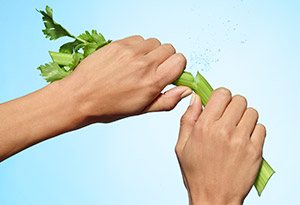5 Surprising Quirks About the Way We Eat

Photo: Adam Voorhes
PAGE 2
Thinking about eating won't make your mouth water.
"A Harvard researcher named Alexander Creighton Kerr brought a group of hungry people into a lab, fried up bacon and eggs in front of them, and found that they didn't salivate more after he began cooking—though one man said he could feel his mouth watering. But as Kerr explained, the anticipation and sight of food simply makes people more aware of the saliva already present in their mouths. The most potent way to produce more saliva is to put something in your mouth and start chewing."
A little gas might be a good thing.
"Hydrogen sulfide—the chemical compound largely responsible for giving our gas its unpleasant odor—is at the forefront of biomedicine right now and may actually be beneficial to our health. We know that over-the-counter medicines like aspirin fight inflammation everywhere in the body but the digestive tract, where they can cause ulcers, and now lab studies are finding that when aspirin works in conjunction with hydrogen sulfide, the two combine to have a tumor-fighting effect. So while hydrogen sulfide is one of the least favorite by-products of digestion, it could turn out to help save our lives."
Got a small stain? Dab it with spit.
"Some of the best stain fighters are right in our bodies, because the enzymes that break down foods during digestion can break down those same foods on our clothes. If you drop a starchy food on your blouse, for instance, you might try rubbing saliva on it—saliva contains amylase, an enzyme that digests starch. If it's a fatty, greasy stain, saliva won't be as effective, because the enzyme that digests fats is produced mostly in the pancreas. That's why laundry detergent works so well—it uses these enzymes on a larger scale—like a digestive tract in a box. The same goes for dishwashing liquids: They 'eat' the food your dinner guests didn't."
More Trivia About the Human Body
"A Harvard researcher named Alexander Creighton Kerr brought a group of hungry people into a lab, fried up bacon and eggs in front of them, and found that they didn't salivate more after he began cooking—though one man said he could feel his mouth watering. But as Kerr explained, the anticipation and sight of food simply makes people more aware of the saliva already present in their mouths. The most potent way to produce more saliva is to put something in your mouth and start chewing."
A little gas might be a good thing.
"Hydrogen sulfide—the chemical compound largely responsible for giving our gas its unpleasant odor—is at the forefront of biomedicine right now and may actually be beneficial to our health. We know that over-the-counter medicines like aspirin fight inflammation everywhere in the body but the digestive tract, where they can cause ulcers, and now lab studies are finding that when aspirin works in conjunction with hydrogen sulfide, the two combine to have a tumor-fighting effect. So while hydrogen sulfide is one of the least favorite by-products of digestion, it could turn out to help save our lives."
Got a small stain? Dab it with spit.
"Some of the best stain fighters are right in our bodies, because the enzymes that break down foods during digestion can break down those same foods on our clothes. If you drop a starchy food on your blouse, for instance, you might try rubbing saliva on it—saliva contains amylase, an enzyme that digests starch. If it's a fatty, greasy stain, saliva won't be as effective, because the enzyme that digests fats is produced mostly in the pancreas. That's why laundry detergent works so well—it uses these enzymes on a larger scale—like a digestive tract in a box. The same goes for dishwashing liquids: They 'eat' the food your dinner guests didn't."
More Trivia About the Human Body



